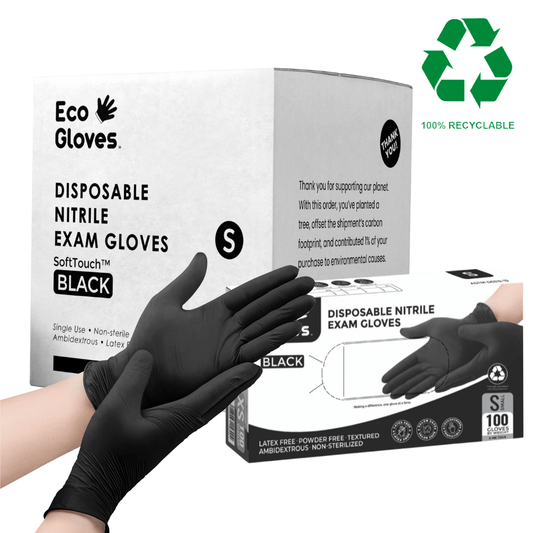Disposable Gloves For Industrial Use: Protecting Workers From Hazards
Eco Gloves
Disposable gloves are an essential tool in many industries, serving as the first line of defense against hazardous substances, contaminants, and potential injuries. They protect workers while enabling the safe and efficient handling of materials. With advancements in glove technology, businesses now have access to a variety of options tailored to specific industrial needs.
This article explores the types of gloves suitable for different industrial applications, the importance of adhering to safety standards, and how eco-friendly alternatives are shaping the future of workplace safety and sustainability.
Topics Covered
- Understanding The Need For Disposable Gloves In Industrial Applications
- Types Of Disposable Gloves For Industrial Use
- Safety Standards And Regulations
- Choosing The Right Gloves For Your Industry
- A Safer And Sustainable Future With Eco Gloves
- Key Takeaways: Choosing the Right Disposable Gloves for Industrial Use
- Frequently Asked Questions About Disposable Gloves for Industrial Use
Understanding The Need For Disposable Gloves In Industrial Applications
Industries such as manufacturing, automotive, chemical processing, healthcare, food handling, and construction expose workers to various risks. Whether dealing with harsh chemicals, sharp materials, or biological hazards, gloves are a critical component of personal protective equipment (PPE).
According to the US Department of Labor, hand injuries account for nearly 23% of all workplace injuries. Many of these injuries could have been prevented with the proper use of gloves. Disposable gloves not only shield against physical harm but also protect workers from chemical burns, infections, and toxic exposure.
Types Of Disposable Gloves For Industrial Use
Selecting the right type of industrial safety glove depends on the specific task at hand and the risks involved. Below is an overview of popular glove types and their industrial applications:
Nitrile Gloves
Features: Durable, puncture-resistant, and chemical-resistant.
Best for: Manufacturing, automotive, chemical handling, production lines, and assembly tasks.
Advantages:
-
- High resistance to punctures and tears.
- Excellent chemical and oil resistance.
- Provides strong grip and dexterity, even when handling fine or slippery objects.
- Latex-free, reducing the risk of allergies.
Eco Gloves Recommendation: Looking for automotive gloves, gloves for chemical handling, or gloves for medical care? Our Premium Nitrile Industrial Gloves offer superior protection and comfort for a wide range of tasks.
Biodegradable Nitrile Gloves
Features: Eco-friendly, durable, and puncture-resistant with accelerated biodegradation technology.
Best for: Sustainable industrial operations, including manufacturing, packing, and assembly.
Advantages:
-
- Same durability and chemical resistance as standard nitrile gloves.
- Environmentally friendly with reduced impact on landfills.
- Latex-free and hypoallergenic.
Eco Gloves Recommendation: Need reliable gloves for industrial applications like manufacturing, packing, or assembly? Our Biodegradable Nitrile Gloves offer superior protection and performance while supporting sustainability efforts.
Neoprene Gloves
Features: Superior chemical resistance and flexibility.
Best for: Handling harsh chemicals, lubricants, and oils; high-risk industrial tasks.
Advantages:
- High resistance to a wide range of chemicals.
- Durable and comfortable for prolonged use.
- Heat-resistant properties for industrial applications.
Vinyl Gloves
Features: Cost-effective, lightweight, and latex-free.
Best for: Light-duty tasks such as packaging and handling non-hazardous materials.
Advantages:
- Affordable for low-risk applications.
- Comfortable for short-term use.
- Smooth fit and feel.
- Free of latex allergens.
Polyethylene (PE) Gloves
Features: Economical, lightweight, and disposable.
Best for: Quick-use tasks in food processing or light industrial applications.
Advantages:
- Easy to wear and remove.
- Cost-effective for high-volume use.
- Suitable for basic protection needs.
Latex Gloves
Features: Flexible, snug-fitting, and highly tactile.
Best for: Detailed work such as electrical assembly or intricate mechanical tasks.
Advantages:
- Superior tactile sensitivity and precision.
- Good elasticity and comfortable fit.
- Biodegradable material.
- Not recommended for individuals with latex allergies.
TPE (Thermoplastic Elastomer) Gloves
Features: Elastic, durable, and cost-effective.
Best for: General industrial tasks, especially where durability is less critical.
Advantages:
- Combines flexibility with durability.
- Comfortable for extended use.
- Latex-free and safe for sensitive skin.
- Economical alternative to other materials.
HDPE Gloves
Features: Ultra-lightweight and durable.
Best for: Minimal contact tasks like handling industrial packaging or general maintenance.
Advantages:
- Provides basic hand protection.
- Extremely lightweight and breathable.
- Cost-effective for high-volume applications.
Compostable Gloves
Features: Made from plant-based or biodegradable materials.
Applications: Ideal for single-use applications like food handling, light cleaning, and light-duty tasks requiring quick changing and disposal.
Advantages:
- Eco-friendly gloves reduce landfill waste and help businesses meet sustainability goals.
Eco Gloves Recommendation: Looking for food handling gloves, gloves for drive-thru operations, or gloves for general hygiene purposes? Our Compostable Gloves offer superior durability and comfort for a wide range of tasks.
Safety Standards And Regulations
Compliance with safety standards ensures that gloves provide the intended protection while meeting regulatory requirements. Below are key disposable glove safety standards that govern the use of disposable gloves in industrial settings:
1. OSHA Disposable Glove Regulations
OSHA mandates the use of PPE, including gloves, to protect workers from occupational hazards. Employers must assess workplace risks and provide gloves certified for specific dangers such as chemical exposure or mechanical injuries.
2. ANSI/ISEA 105
The American National Standards Institute (ANSI) provides guidelines for glove performance in areas such as abrasion resistance, cut resistance, and chemical permeation. Gloves are rated on a scale, helping businesses select the appropriate protection level.
3. FDA Guidelines
For industries like food handling and healthcare, the Food and Drug Administration (FDA) regulates gloves to ensure they meet hygiene and safety standards.
4. Environmental Standards
Eco-conscious businesses can look for certifications like ASTM D6400 for compostable materials or EN 374 for chemical resistance in biodegradable gloves.
Choosing The Right Gloves For Your Industry
Selecting the right disposable gloves for your industry involves understanding the specific hazards and operational requirements. The goal is to strike a balance between safety, functionality, comfort, and, where possible, sustainability. Below, we provide a deeper look into industry-specific considerations and how to make the best choice.
1. Chemical Processing and Handling
Key Hazards: Exposure to hazardous chemicals, solvents, and corrosive substances.
Recommended Gloves:
-
- Nitrile gloves are ideal due to their superior resistance to a wide range of chemicals, including oils and acids.
- For added protection, opt for thicker nitrile gloves for industrial use that have extended cuffs to safeguard wrists and forearms.
Features to Look For: High chemical resistance (measured by permeation ratings), puncture resistance, and textured grip for secure handling.
2. Manufacturing and Assembly
Key Hazards: Risk of cuts, abrasions, punctures, and exposure to industrial oils or lubricants.
Recommended Gloves:
-
- Nitrile gloves for oil resistance and dexterity.
- Cut-resistant gloves with a nitrile coating for additional safety during high-risk tasks.
Features to Look For: Abrasion resistance, tactile sensitivity, and ANSI/ISEA 105 ratings for cut and puncture resistance.
3. Food Processing and Service
Key Hazards: Contamination risks, hygiene compliance, and handling wet or greasy food items.
Recommended Gloves:
-
-
- Vinyl gloves for general food preparation tasks.
- Polyethylene gloves for single-use applications like handling ready-to-eat foods.
-
Eco-friendly biodegradable gloves for businesses aiming to reduce environmental impact.
-
Features to Look For: FDA-approved food-grade materials with powder-free design to avoid residue and easy disposal.
4. Healthcare and Laboratory Work
Key Hazards: Contact with infectious agents, bodily fluids, and hazardous materials.
Recommended Gloves:
-
- Latex gloves for superior fit and sensitivity when performing intricate tasks like surgeries or lab experiments.
- Nitrile gloves for workers with latex allergies and those needing chemical resistance.
Features to Look For: Sterility, high puncture resistance, and compliance with FDA and ASTM standards for medical use.
5. Automotive and Mechanical Work
Key Hazards: Exposure to oils, greases, sharp tools, and engine heat.
Recommended Gloves:
-
- Thick nitrile gloves for superior resistance to petroleum-based products and high durability.
- Hybrid gloves (such as nitrile-coated materials) for extended wear during heavy-duty tasks.
Features to Look For: Enhanced grip, durability, and heat resistance.
6. Construction and Heavy Industry
Key Hazards: Exposure to sharp materials, rough surfaces, and abrasive tools.
Recommended Gloves:
-
- Industrial-grade nitrile gloves for light tasks requiring dexterity and puncture resistance.
- Specialized gloves with reinforced materials for tasks requiring heavy-duty protection.
Features to Look For: High tear resistance, compliance with ANSI abrasion and cut-resistance standards, and easy-on/easy-off design for efficiency.
7. Janitorial and Cleaning Services
Key Hazards: Contact with cleaning chemicals, biohazards, and dirt.
Recommended Gloves:
-
- Nitrile gloves for chemical resistance and flexibility.
- Latex gloves for high sensitivity during detailed cleaning tasks.
- Eco-friendly options for companies aiming to minimize waste.
Features to Look For: Chemical resistance, waterproof materials, and a powder-free design to avoid contamination.
8. Electronics and Precision Assembly
Key Hazards: Static electricity, delicate components, and contamination risks.
Recommended Gloves:
-
- Antistatic nitrile gloves to prevent static buildup and ensure product safety.
- Latex gloves for precise handling of small components (if no latex allergy exists).
Features to Look For: Antistatic properties, snug fit, and low particulate shedding.
A Safer And Sustainable Future With Eco Gloves
Disposable gloves are essential for ensuring worker safety across a variety of industries, from manufacturing and packing to processing and assembly. Choosing the right gloves—whether durable gloves for heavy-duty tasks, gloves for precision work, or textured gloves for enhanced grip—can make all the difference in performance and protection. Options like thick gloves or extra-thick gloves provide superior puncture and chemical resistance, while gloves of varying thicknesses cater to specific job requirements.
At Eco Gloves, we understand the importance of both safety and environmental sustainability. That’s why we offer an extensive selection of industrial gloves designed for every need, including eco-conscious solutions that protect both workers and the planet. Explore our, black gloves, blue gloves, textured gloves, biodegradable nitrile gloves and other sustainable options for manufacturing, packing, processing, and assembly tasks. Contact us to find your perfect fit and take a step toward a safer, greener workplace.
Key Takeaways: Choosing the Right Disposable Gloves for Industrial Use
- Disposable gloves are critical in protecting workers from hazards such as chemicals, sharp objects, contamination, and extreme temperatures across multiple industries.
- Choosing the right glove depends on the specific job requirements, including material durability, chemical resistance, tactile sensitivity, and comfort.
- Nitrile gloves offer superior puncture and chemical resistance, making them ideal for high-risk industrial applications, while biodegradable nitrile gloves provide the same performance with added environmental benefits.
- Other glove materials, such as vinyl, polyethylene, neoprene, latex, TPE, and compostable options, serve specific purposes for light-duty, quick-change, or eco-conscious needs.
- Compliance with OSHA, ANSI/ISEA 105, FDA, and environmental standards
- Eco Gloves provides high-quality industrial glove solutions, including eco-friendly alternatives, to protect workers while reducing environmental impact.
👉 Protect your team and the planet with Eco Gloves’ industrial-grade nitrile, biodegradable, and specialty gloves—engineered for safety, comfort, and sustainability.
Frequently Asked Questions About Disposable Gloves for Industrial Use
-
Why are disposable gloves important for industrial work?
They protect workers from hazards like cuts, abrasions, chemical exposure, and contamination, ensuring both safety and efficiency in the workplace.
-
What is the most durable type of disposable glove for industrial applications?
Nitrile gloves are considered the most durable, offering excellent resistance to punctures, chemicals, and oils, while providing a strong grip and dexterity.
-
Are biodegradable nitrile gloves as strong as regular nitrile gloves?
Yes. Biodegradable nitrile gloves have the same durability, chemical resistance, and performance as standard nitrile gloves but break down faster in landfill conditions.
-
Which safety standards should industrial gloves meet?
Look for compliance with OSHA regulations, ANSI/ISEA 105 ratings, FDA guidelines (for food or healthcare use), and relevant environmental certifications like ASTM D6400.
-
How do I choose the right glove material for my industry?
Match the glove type to the hazards in your workplace—nitrile for chemical and puncture resistance, vinyl for cost-effective food handling, neoprene for harsh chemicals, latex for high tactile sensitivity, and compostable gloves for eco-friendly light-duty tasks.


















